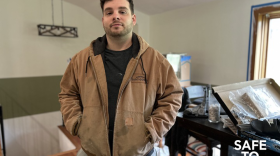New Hampshire wants the Air Force to cover the cost of drinking water assistance for three homes near the former Pease Air Base with PFAS chemical contamination in their home wells.
It's the latest escalation in a dispute over whether the Air Force has to follow New Hampshire's new limits on PFAS in drinking water as part of ongoing groundwater cleanup around Pease.
PFAS are toxic industrial compounds that were used for decades in a range of products. They've been linked to kidney and liver disease, high cholesterol, immune deficiencies and reproductive and developmental problems, as well as potentially some cancers.
There are thousands of these chemicals, which don't break down easily in the environment and are the basis of a kind of firefighting foam that won't be phased out of military use until 2024.
This foam caused extensive PFAS contamination in the groundwater beneath Pease. The Air Force has worked for years to remediate it, following the only federal guideline that exists for PFAS: a non-binding health advisory level from the Environmental Protection Agency.
New Hampshire is one of only a few states that have adopted their own binding limits on certain kinds of PFAS in drinking water and groundwater -- limits that are several times more restrictive than the EPA's advice.
But the Air Force has so far refused requests to follow these standards at Pease from New Hampshire officials and members of Congress.
The Air Force says no one around Pease is drinking water with a higher level of PFAS than the EPA recommends, but they say they'll consider New Hampshire’s standards as part of a remedial investigation that's set to continue through the end of 2022.
Some treatment technology is already installed at Pease, but officials say it’s designed to focus on shallower, disproportionately contaminated groundwater and won't directly help clean the deeper part of the aquifer that feeds neighboring wells.

In a letter to the Air Force, or USAF, this month, Gov. Chris Sununu joined state regulators and New Hampshire's Congressional delegation in pushing back on the Air Force's stance.
"The USAF's position on this matter is troubling to me, and I urge you to reconsider," Sununu wrote. "The families living in these homes should not have to wait two years or more for the USAF to determine whether they deserve safe drinking water."
The state says it began providing bottled water to three Newington homes with excessive PFAS levels in their wells this fall.
They're also using state hazardous waste funds for a contractor to plan public water hook-ups or home filters as a permanent solution for these homes.
In his recent letter, Sununu formally requests that the Air Force cover the cost of that work, saying he "strongly believe[s] that this is and should be the responsibility of the USAF."
Air Force officials did not respond to a request for comment on Sununu's letter.
Scientist and former state representative Mindi Messmer has worked on this issue for years and agreed that the Air Force's position is unacceptable.
"The state of New Hampshire has ruled in a way that's based on peer-reviewed science," Messmer said of the state's PFAS standards. "That needs to be communicated to these residents, so they're not having some false feeling that this water is safe when the state of New Hampshire does not think it is."
In addition to their lack of federal regulations, PFAS are not yet listed as an official contaminant under the nation's Superfund law. This governs the Pease site and, Messmer said, has enabled the Air Force to take this stance across the country.
Private wells are also not subject to federal regulation. The state considers them contaminated under its ambient groundwater quality standard, which mirrors the PFAS limits for public water.
Messmer is also a member of the community advisory board on the Pease cleanup. The dispute with the Air Force is likely to come up when that group meets next, virtually, on December 2.








